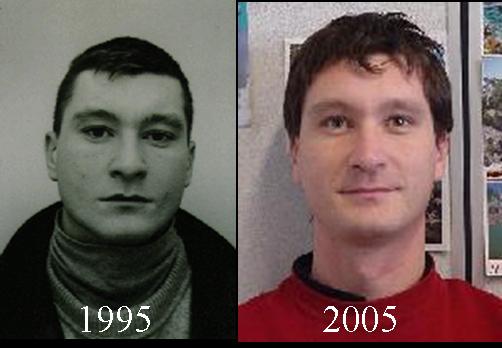
Cognitive Vision: video understanding, scene understanding, event recognition, behaviour analysis, activity monitoring, muti-sensor fusion, multimedia interpretation,
Computer Vision: video processing, mobile object perception and tracking, motion analysis, object detection, pattern recognition,
Artificial Intelligence: knowledge-based systems, spatio-temporal reasoning, machine learning, scenario modelling, context representation, uncertainty handling, knowledge acquisition, ontology,
Autonomous Systems: real-time systems, system evaluation, parameter tuning, system configuration, system design, 3D visualisation,
Miscellaneous: applied research.
François Brémond is a researcher in the PULSAR team at INRIA Sophia Antipolis. He obtained his Master degree in 1992 from ENS Lyon. He has conducted research works in video understanding since 1993 both at Sophia-Antipolis and at USC (University of Southern California), LA. In 1997 he obtained his PhD degree from INRIA in video understanding and François Brémond pursued his research work as a post doctorate at USC on the interpretation of videos taken from UAV (Unmanned Airborne Vehicle) in DARPA project VSAM (Visual Surveillance and Activity Monitoring). In 2007 he obtained his HDR degree (Habilitation à Diriger des Recherches) from Nice University on Scene Understanding: perception, multi-sensor fusion, spatio-temporal reasoning and activity recognition.
He designs and develops generic systems for dynamic scene interpretation. The targeted class of applications is the automatic interpretation of indoor and outdoor scenes observed in particular with monocular colour cameras. These systems detect and track mobile objects, which can be either humans or vehicles, and recognize their behaviours. He is particularly interested in filling the gap between sensor information (pixel level) and behaviour recognition (semantic level). François Brémond is author or co-author of more than 70 scientific papers published in international journals or conferences in video understanding. He is reviewer for several international journals (CVIU, IJPRAI, IJHCS, PAMI, AIJ, Eurasip JASP,...) and conferences (CVPR, ICCV, AVSS, VS, ICVS,…). He has (co-)supervised 12 PhD theses. He is an EC INFSO and French ANR Expert for reviewing project. He was teaching numerical classification at Nice University and teachs now video understanding in a High Engineer School at Master level.
He has participated to 7 European projects (Esprit, ITEA, FP6, FP7: PASSWORDS, ADVISOR, AVITRACK, SERKET, CARETAKER, CANTATA, COFRIEND), one DARPA project, 10 French projects (ANR, DGE, Prédit, TechnoVision, PACA, CG06,...), several industrial research contracts (Bull, Vigitec, SNCF, RATP, ALSTOM, STMicroElectronics, Thales,...) and several international cooperations (USA, Taiwan, UK, Belgium) in video understanding. For instance, he has managed to recognize a large variety of scenarios in different applications: fighting, abandoned luggage, graffiti, fraud, crowd behavior in metro stations, on roads and onboard trains, aircraft arrival, aircraft refueling, luggage loading/unloading on airport aprons, bank attack in bank agencies, access control in buildings, office behavior monitoring for ambient intelligence, elderly activity monitoring for homecare applications and wasp monitoring for biological application. He has also participated to the ARDA workshops to build an ontology on video events. In PULSAR team, François Brémond is technically managing the video scene understanding group.
See other documents:
- Long CV, version in French (2008)
- Long CV, version in English (2009)
- A summary of my research activities (2009) and my research program for the coming years.
- A complete list of my publications (.doc) up to 2009 and a selection of my main paper abstract.
- Short CV, version 2005 (1 page)
En Français:
François Brémond est un chercheur permanent du projet PULSAR. Il a mené ses travaux de recherche dans le domaine de l'interprétation vidéo depuis 1993, à Sophia-Antipolis et à l'USC (University of Southern California). Il a participé à 7 projets européens sur l'analyse et l'interprétation vidéo (Esprit, ITEA, FP6, FP7), à 10 projets nationaux (ANR, DGE, Prédit, PACA, CG06,...), à de nombreux contrats industriels (Bull, Vigitec, SNCF, RATP, ALSTOM, STMicroElectronics, Thales,...) et plusieurs coopérations internationales (USA, Taiwan, UK, Belgium). Il a conçu des systèmes de reconnaissance de scenarios au cours de différentes applications de vidéo surveillance et monitoring : bagarre, bagage abandonné, graffiti, fraude, comportements anormaux de groupe d'individus et foule dans des stations de métro, dans des espaces publics et dans des trains, arrivage et maintenance d'avion (e.g. plein d'essence), chargement et déchargement de bagages dans un avion, surveillance d'agence bancaire, contrôle d'accès dans des bâtiments, ainsi que le monitoring de personnes âgées pour des applications de soins à domicile et le monitoring de guêpes pour une application biologique.
- Online Adaptive Neural Classifier for Robust Tracking
- the GER'HOME project on Elderly Monitoring
- the CARETAKER project for Knowledge Discovery
- the RATP Project on metro access control
- St Micro-Electronics for Human Posture Recognition
- the ETISEO project for Video Surveillance Performance Evaluation
- the AVITRACK project for airport apron monitoring
- Trichogramma (animal) monitoring
- the CASSIOPEE project for Bank Agency Monitoring
- the European Project ADVISOR on metro monitoring
- the European Esprit HPCN PASSWORDS Project
- the SAMSIT project for onboard train monitoring
- Incremental Learning of Events in Video
For more information, see the complete list of 25 Research Projects